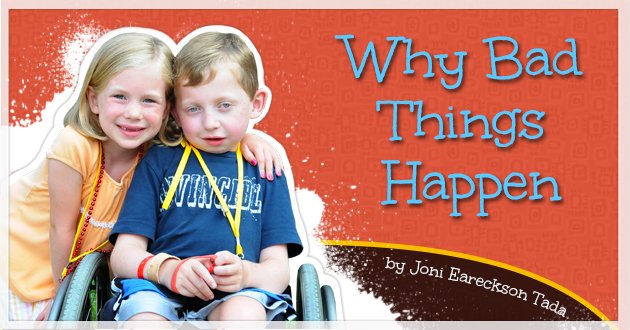Speculative Fiction And Our Culture
 Yesterday at church I found in our library the non-fiction book Life in the Balance by Joni Eareckson Tada and Joni & Friends. I’ve learned a lot from Joni and her ministry, but I admit I haven’t read a lot of her later books. This one I eagerly checked out.
Yesterday at church I found in our library the non-fiction book Life in the Balance by Joni Eareckson Tada and Joni & Friends. I’ve learned a lot from Joni and her ministry, but I admit I haven’t read a lot of her later books. This one I eagerly checked out.
Surprise, surprise, the book is not at all what I thought it would be, though I’m not quite sure what that was. Here’s a part of the foundation Joni lays in chapter one:
The other day, while having coffee with my friend Shirley, our conversation turned to the unlikely subject of people in comas. Six months earlier, her cousin had suffered a severe stroke and has yet to respond. With hopes for a full recovery quickly diminishing, and health insurance nearly depleted, Shirley explained that her cousin was yet again transferred to another nursing home. This one was more of a state-subsidized warehouse for “hopeless cases.” My friend looked at me with doleful eyes. “What would you say to the family, Joni?”
It happens to me more often than it use to . . . questions like that. And they’re not just about end-of-life implications o someone in a coma. Today, it’s questions about stem cell research and abortion. It’s what to do with the little boy with autism who’s disrupting Sunday School, or the marriage that’s cracking apart from caring 24/7 for a parent with Alzheimer’s . . .
Joni goes on to give a thumbnail sketch of each of the upcoming chapters, and it’s clear, this book is about ethics in a culture undergoing scientific and technological change that is outstripping our understanding of their implications. How do we as Christians know what to do when we face troubling circumstances: disabilities, abortion, choices between life and death? All of that makes me think, What do we as Christians do in a world of super drones and string theory and cloning and possible pandemics and the push for euthanasia?
Serious subjects. At least one speculative author has taken the task of facing such questions head on in her fiction. I’m referring to Karen Hancock in her 2009 novel Enclave.
Here’s what I wrote soon after its release:
Karen Hancock’s The Enclave [is] a science fiction/suspense novel dealing with such issues as cloning, genetic engineering, and cryogenics. One of the things that struck me about this novel was how necessary it is. We live in an era of scientific revolution, much of it centered on the human genome.
For me as a non-science oriented person, I’d just as soon ignore it all. But the fact is, the discoveries of today will be married to a set of ethics to be determined, and that interplay will affect society. We Christians need to be at the forefront mapping out how right and wrong fit with these new discoveries. Because Man can clone, should he? Because Man can tweak a baby’s DNA to make him taller or stronger or maler, should he?
Karen Hancock opens up a number of these scientific topics, then couples them with an exploration of cult activity. But here’s the thing. Karen says what Christians need to hear. Her story brings serious matters front and center, not in the form of absolutes already digested, but in the form of questions.
After all, the protagonist in The Enclave is a brilliant geneticist, and he is a Christian. Not an Intelligent Design Christian, either, but one who believes in creation. You see the questions that spring to mind with nothing more than that simple description.
It is this aspect of speculative fiction—the ability to look at the hard issues, the complex topics—that I think too many people overlook…
The Enclave doesn’t dodge any of it, but neither does it give easy or simplistic answers. The problem isn’t “cloning,” or the answer, “down with science.” Instead, because of the second story thread, the one for which the book is named, the real problem comes to light—Man has a desire to be God.
The science issues, then, take a backseat. There is no answer to them apart from the answer of bowing to our sovereign God and saying, Your will, not mine. No legislation will insure that cloning will not violate someone’s human rights or spiritual well-being. No advancement in the study of longevity will ensure immortality. In other words, the science issues, while important for us to think about, should only lead us to the realization that God must be honored as God before we proceed in these endeavors.
And as our culture shuttles Him off to the side and claims that faith should be private, not public, we open ourselves up to antichrist figures such as the one that serves as the antagonist in The Enclave. Yet again we see the truth surface in a work of speculative fiction.
What books have you read that are addressing the big issues of our day? Can speculative fiction do a better job of that than can non-fiction or contemporary fiction? Why do you think so, or not?









































Wow, great topic, Becky. Your posts are always insightful and make us think hard (and that’s a good thing!).
I guess my answer would be: each genre has its place in telling hard truths. Non-fiction isn’t inferior to speculative fiction or vice versa. In non-fiction, the author is usually clear about his topic and opinion, and chances of misinterpretation are probably lower! Speculative fiction, on the other hand, can act as a mirror; sometimes things are more vivid when reflected back instead of seen in front.
Maybe I’m living in a box, but I haven’t read many recent publications (although I’m very interested in The Enclave). It’s Lord of the Rings that comes to mind here, addressing a topic for our culture: specifically, the characters’ reaction to evil. I get the idea American society denies the truth of total depravity (the individual is good, but society* corrupts; he probably had a difficult childhood and that’s why he shot those people; and excuses like that). But the LotR characters never excuse evil (“Wormtongue was abused by his boss!”) or try to reason with evil (“Do we really need to fight Sauron? Maybe if we each give a little, we can work something out.”). No, the heroes fight evil head on and call it what it is, furthermore.
Also, I don’t recall the heroes excusing their struggles against sin (“What are you talking about, Sam; I haven’t succumbed to the Ring! So what if it’s on my finger?”). And those who deny their failings as sin either look stupid (Legolas and Gimli with their early prejudice) or fall to greater temptation (Boromir) or to a nasty death (Denethor).
I could go on…but that’s what popped into my mind.
Great post, Becky!
Blessings,
Literaturelady
* made, incidentally, of individuals.
Great comment, LL. I think you’ve done an excellent job revealing the ways in which LotR addresses Western culture’s issues, even though they probably weren’t more than a gleam in the eye of atheistic philosophers when Tolkien wrote the books. Now if we can do the same today re. the newer issues that challenge the old ethics.
Becky
Unwind, by Neal Shusterman, has a creepy and unsettling premise of teenagers being unwound for parts– perhaps a bit over-the-top for some people, but it really makes one wonder about organ transplants and what a “culture of life” would really be.
Galadriel, I haven’t heard of Unwind before. It does sound a bit creepy, but it reminds me of the premise of one of my writing partner’s stories. What people won’t do to keep living. And yes, it does seem to challenge the idea that there are no exceptions to the practical working out of the “culture of life.”
Merrie Destefano’s first novel (Afterlife, I think) flipped life/death issues on their head. Man had learned how to extend life without end, but Christians (she didn’t call them that in the book) advocated for death (no going to heaven if you don’t die). Well, actually they advocated to be “one lifers.”
Actually Jill Williamson’s new book Captives suggests that the people in the Safe Lands have also learned how to renew life, but only up to nine times. This aspect doesn’t come out as a major factor in this first book, but I think the story is set up to make it an issue in future books in the series.
I think writing science fiction or futuristic fantasy makes it a little easier to play with these ethical issues, at least when it comes to the things that may come up because of the advancement of science and technology. I suppose political, social, religious issues can be addressed in any type of speculative novel.
Becky